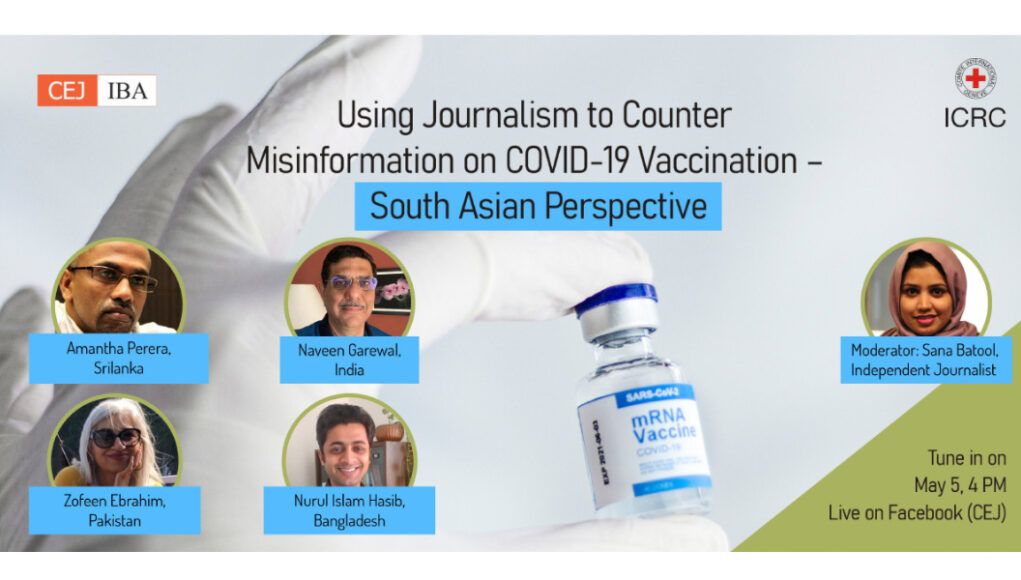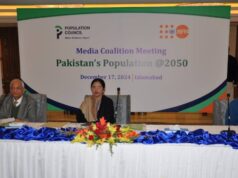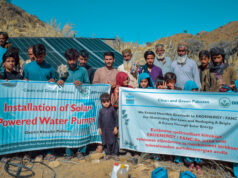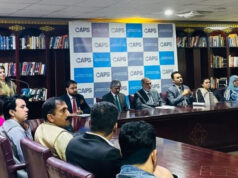Press Release
The Centre for Excellence in Journalism (CEJ) at the Institute of Business Administration (IBA) in collaboration with the International Committee of the Red Cross (ICRC) held a webinar on combatting the spread of fake news about COVID-19 vaccination in South Asia.
Karachi: “Years ago we came across this phrase that the medium is the message. As journalists we need to acquire this new (digital) media as our own and make sure that we go out and keep putting out authentic journalism that stands out and people have access to it,” said Amantha Perera, a researcher at CQ University in Australia, during a webinar conducted by the Centre for Excellence in Journalism (CEJ) at the Institute of Business Administration (IBA) in collaboration with the International Committee of the Red Cross (ICRC).
Mr. Perera was representing Sri Lanka on the panel that aimed to discuss combatting the spread of misinformation about the COVID-19 vaccination in South Asia. Other members on the panel included Ms. Zofeen Ebrahim from Pakistan, an independent journalist based in Karachi, Mr. Nur ul Islam Hasib from Bangladesh, a special correspondent for the Bangladesh Post, and Mr. Naveen Garewal from India, the Chief of Bureau at the Tribune Chandigarh. The session was moderated by Ms. Sana Batool, an independent journalist who contributes to BBC Urdu and DW.
“All of us, irrespective of age and irrespective of where we come from, if we are journalists, we need to become digital native journalists because for the world out there the mobile phone is not alien, it is an extension of their arm or part of their body. We need to figure out how to take advantage of that and keep doing journalism,” continued Mr. Perera.
Commenting on the spread of misinformation regarding the COVID-19 in India, Mr. Garewal said, “There are about 3,000 to 5,000 deaths happening every day. It is heartbreaking to see how young people are dying for the lack of oxygen and the lack of knowledge on how to deal with this. The WhatsApp university has spread A lot of misinformation compared to the real media, which is the television or the serious online media. The politicians have also done their bit in spreading disinformation, for example, in India, they have been saying drink cow urine and this will lead to a cure. These are elected members of the assembly and the parliament, they are taken very seriously.”
Moreover, Ms. Ebrahim shared that one of the biggest challenges the journalists face when covering the pandemic is handling data. “For journalists, this is all very scientific. Interpreting, understanding, and being able to put data in a manner that the layperson can understand is a challenge,” she said.
Addressing the question of how journalists can combat misinformation regarding the COVID-19 vaccination, Mr. Hasib said that journalists need to be very careful with who they interview on the topic. “Anyone can become an expert on social media, but not even every doctor is a pandemic expert. If I was a journalist to interview a doctor without checking their background, then there will be chances to spread inaccurate information,” he stated.
After two rounds of questions from the moderator to the panelists, the session came to an end with queries from the live audiences.
The webinar was organized jointly by the CEJ-IBA and ICRC. The organizations have been in a partnership for the last four years. They have been working together to improve standards of humanitarian reporting in order to ensure accurate, ethical and responsible reporting during humanitarian and disaster response crisis situations. The CEJ-IBA and ICRC collaborate to conduct training and webinars on a regular basis throughout the year.
Share your comments!








